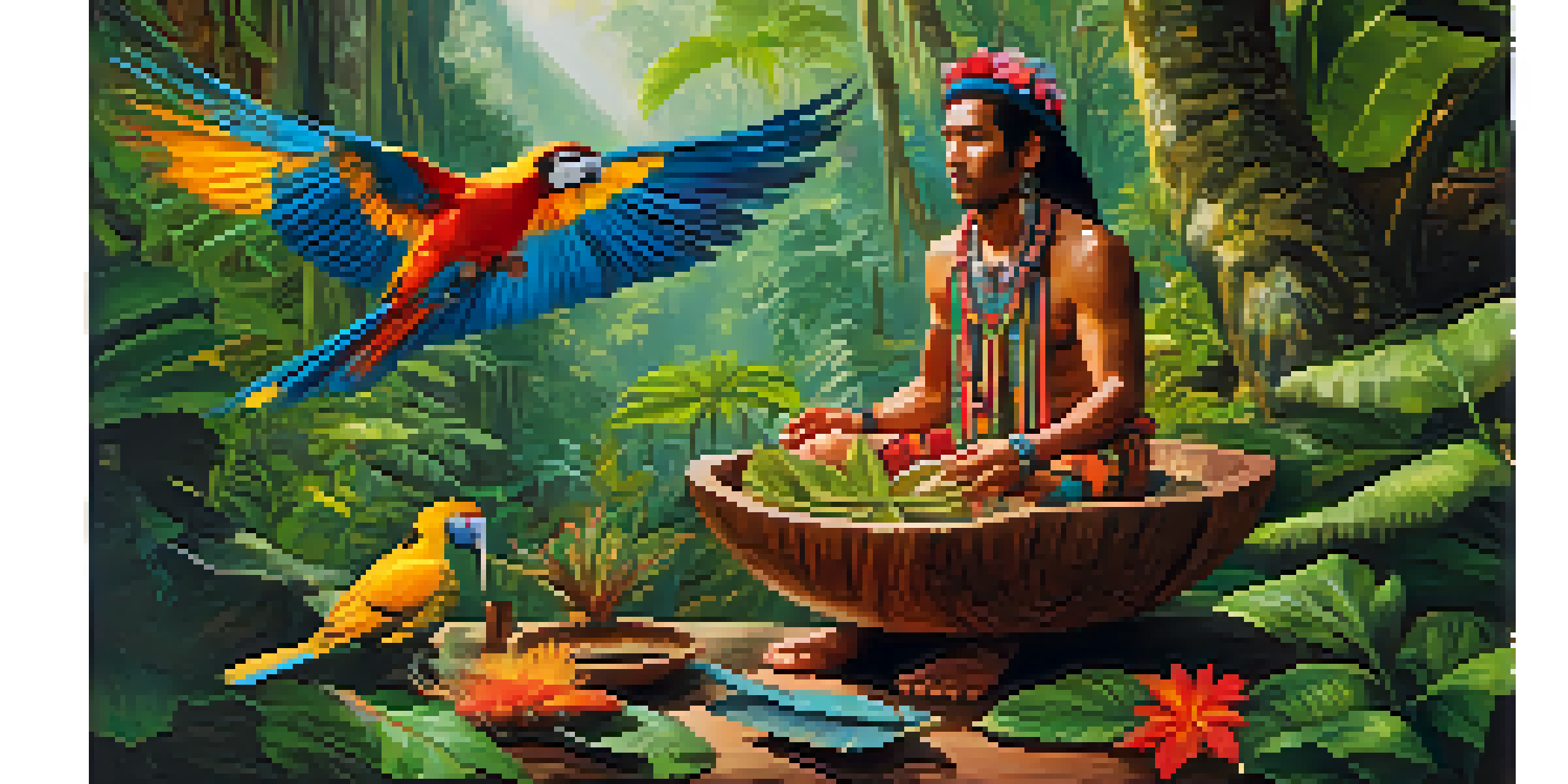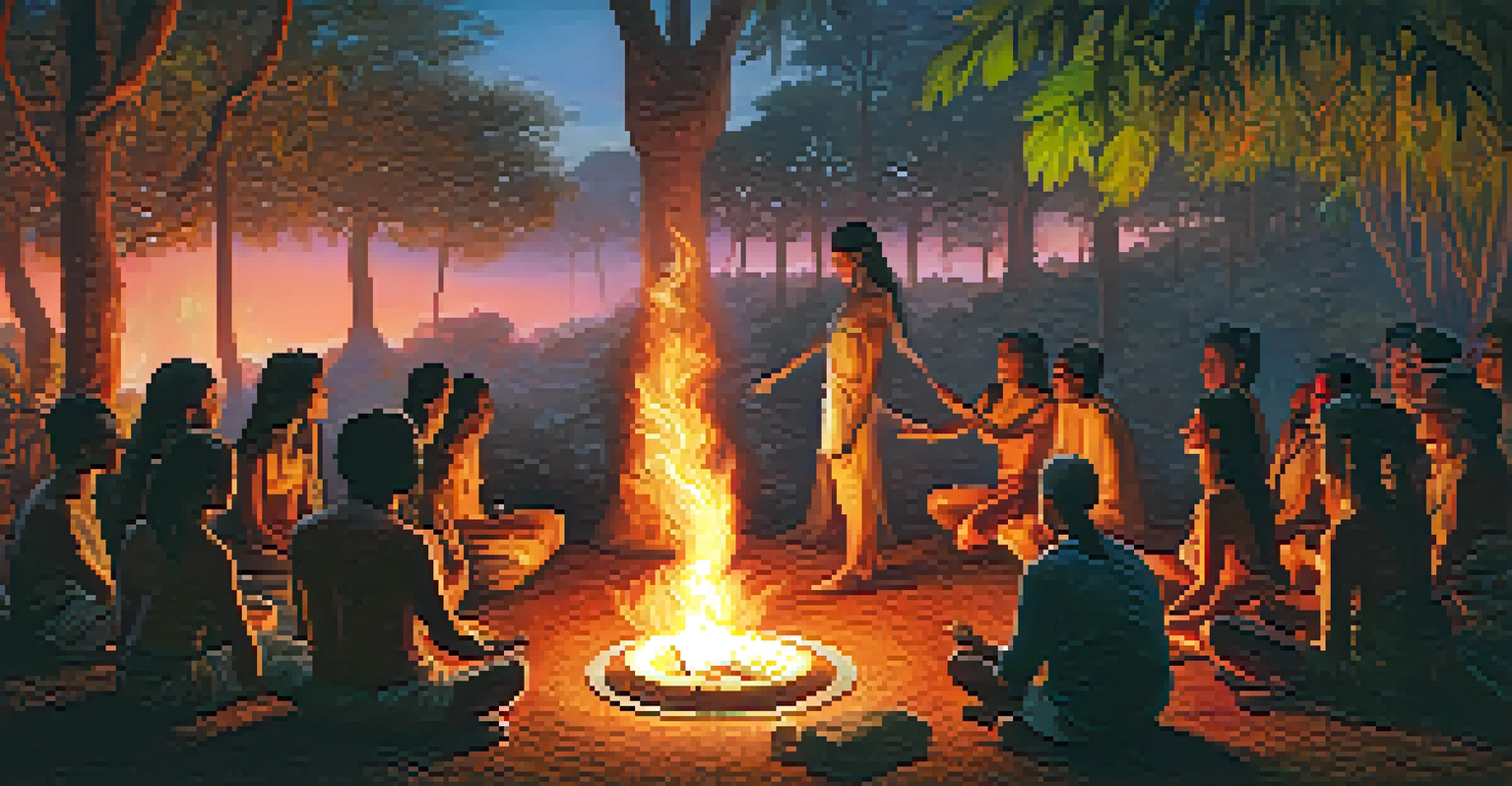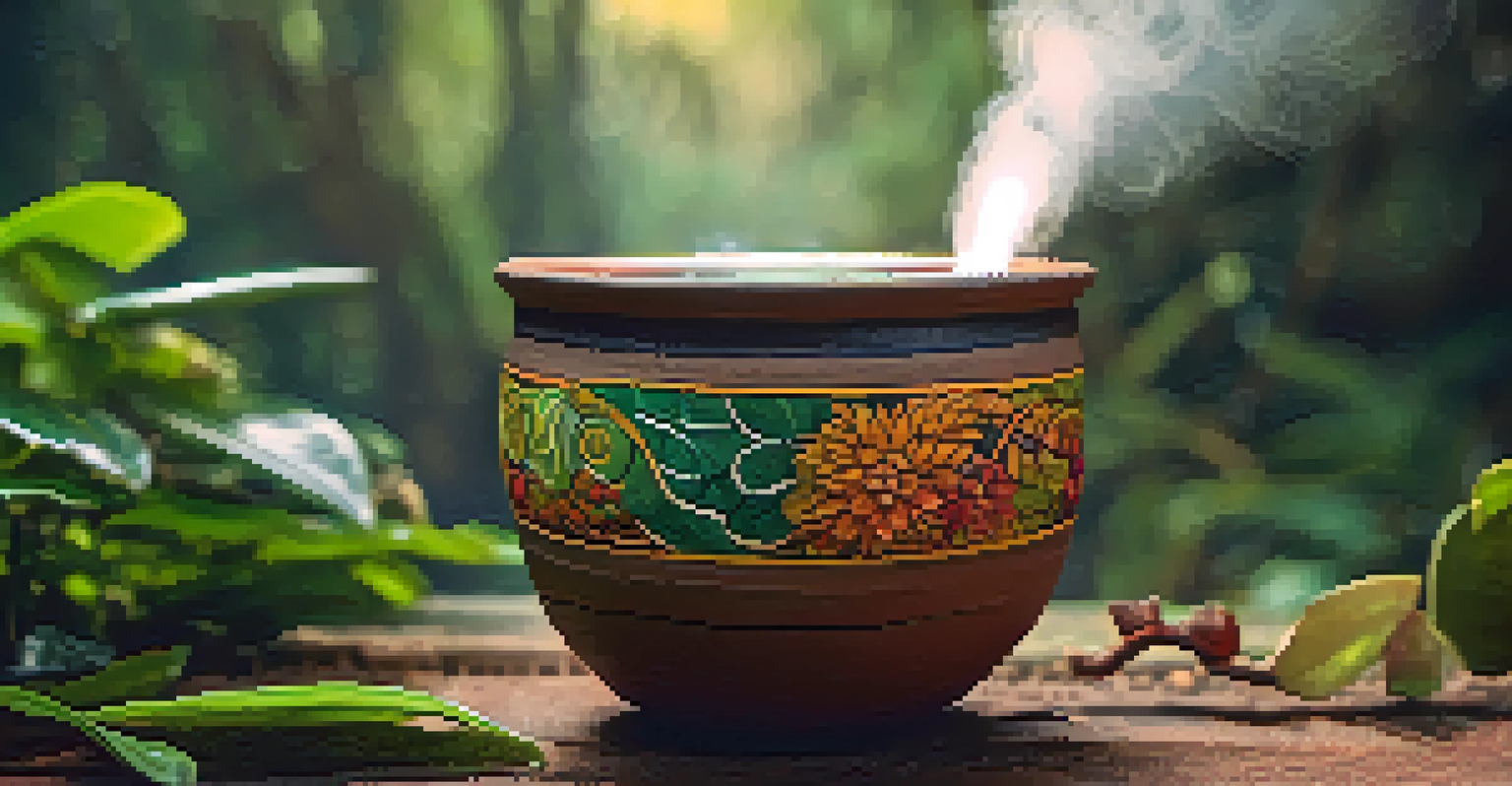Exploring the Role of Ayahuasca in Amazonian Cultures Today

Understanding Ayahuasca: A Sacred Amazonian Brew
Ayahuasca is a powerful brew made from the Banisteriopsis caapi vine and other plant ingredients, often used in spiritual ceremonies. Traditionally, it has been revered by indigenous communities in the Amazon for its psychoactive properties and its ability to facilitate deep introspection. The experience is said to connect individuals with their inner selves and the spirit world, creating a bridge between the material and the mystical.
The plant is a bridge to the spirit world and our own inner consciousness.
Today, Ayahuasca has gained international attention, attracting seekers from around the globe who are looking for healing and spiritual growth. This interest has sparked a renewed appreciation for the traditional practices of Amazonian cultures, prompting a blend of ancient wisdom and modern exploration. It's fascinating to see how a local tradition has become a global phenomenon, opening up discussions about spirituality and mental health.
However, with this growing popularity comes the challenge of preserving the authenticity of the rituals while ensuring they are respectful and beneficial to both the participants and the indigenous communities. Understanding the significance of Ayahuasca requires not only experiencing it but also acknowledging the rich cultural heritage from which it originates.
The Spiritual Significance of Ayahuasca in Rituals
In Amazonian cultures, Ayahuasca is often consumed during rituals led by experienced shamans, who guide participants through the journey. These ceremonies are deeply spiritual, often aimed at healing, divination, or connecting with ancestors. The shaman's role is crucial, as their knowledge of the plant and the spiritual realm helps facilitate a safe and transformative experience.

The rituals often incorporate music, songs, and chants, known as icaros, which enhance the experience and create a sacred atmosphere. Participants often report profound insights during their Ayahuasca journeys, leading to emotional release and personal understanding. This shared experience fosters a strong sense of community among participants, reinforcing the importance of collective healing.
Ayahuasca's Cultural Significance
Ayahuasca plays a vital role in Amazonian rituals, promoting healing, community bonds, and cultural identity.
Moreover, these rituals are not just about individual growth; they are also a way of preserving cultural identity. By maintaining these traditions, Amazonian communities are able to pass down their knowledge and values to future generations, ensuring that their cultural heritage remains vibrant in a rapidly changing world.
Healing and Therapeutic Benefits of Ayahuasca
Ayahuasca has gained recognition for its potential therapeutic benefits, particularly in treating mental health issues such as depression, anxiety, and PTSD. Scientific studies have begun to explore how the compounds in Ayahuasca can promote neuroplasticity, which may help individuals rewire negative thought patterns. Many participants report feeling a sense of clarity and emotional release after their experiences, which can lead to lasting change.
To heal is to touch with love that which we previously touched with fear.
The healing process during an Ayahuasca ceremony can be intense, often bringing repressed memories and emotions to the surface. This cathartic experience allows individuals to confront their fears and traumas in a supportive environment. Participants often describe the feeling of being 'reborn,' emerging from the experience with a new perspective on life and a sense of renewed purpose.
However, it's essential to approach Ayahuasca with caution and to seek guidance from qualified shamans or practitioners. The experience can be overwhelming, and not everyone may be suited for it. As the conversation around mental health evolves, Ayahuasca serves as a reminder of the importance of holistic approaches to healing, integrating both mind and spirit.
Cultural Exchange: Ayahuasca and Global Awareness
The globalization of Ayahuasca has sparked a cultural exchange that benefits both participants and indigenous communities. As people travel to the Amazon to experience Ayahuasca, they often gain a deeper understanding of the cultures and traditions associated with this sacred brew. This increased awareness can foster respect and appreciation for the indigenous ways of life, encouraging a more profound sense of connection to the planet.
However, this exchange is not without its complexities. The commercialization of Ayahuasca retreats can sometimes lead to exploitation and misrepresentation of indigenous practices. It's crucial for participants to educate themselves and choose retreats that prioritize cultural integrity and the well-being of local communities.
Therapeutic Potential of Ayahuasca
The brew is recognized for its potential to address mental health issues, fostering emotional release and personal transformation.
Engaging with Ayahuasca in a respectful manner requires acknowledging the roots of this practice and supporting the communities that have preserved it for centuries. By doing so, participants can contribute to a more sustainable and ethical approach to spiritual exploration.
Environmental Wisdom: Ayahuasca and Nature Conservation
Ayahuasca's connection to the Amazon rainforest highlights the importance of environmental conservation in preserving both the brew and the cultures that utilize it. The plants used in Ayahuasca ceremonies are integral to the ecosystem, and their survival is threatened by deforestation and climate change. As more individuals seek Ayahuasca experiences, there is a growing awareness of the need to protect these vital habitats.
Indigenous communities often emphasize the concept of 'living in harmony with nature,' which resonates deeply with the teachings of Ayahuasca. By participating in these rituals, individuals are reminded of their connection to the earth and the responsibility to protect it. This awareness can inspire action, leading to environmental advocacy and support for sustainable practices.
Moreover, some Ayahuasca practitioners are working to create initiatives that promote reforestation and conservation efforts in the Amazon. By linking spiritual practices with environmental stewardship, they aim to foster a greater appreciation for biodiversity and the interdependence of all living beings.
Challenges Facing Ayahuasca Traditions Today
Despite its growing popularity, Ayahuasca faces several challenges that threaten its traditional practices. As more people flock to the Amazon seeking spiritual experiences, indigenous communities are grappling with the impact of tourism on their cultural heritage. The influx of outsiders can lead to cultural appropriation and the dilution of sacred rituals.
Additionally, the commercialization of Ayahuasca has raised concerns about the authenticity of experiences offered in retreats. Some establishments prioritize profit over genuine spiritual guidance, which can result in unsafe or disrespectful practices. It's essential for participants to be discerning when choosing where to partake in Ayahuasca ceremonies, ensuring they align with traditional values.
Challenges of Ayahuasca Globalization
The rising popularity of Ayahuasca brings challenges like cultural appropriation and commercialization, threatening its authenticity.
These challenges highlight the importance of ongoing dialogue and collaboration between indigenous communities and outsiders. By respecting and supporting the traditional practices of Ayahuasca, we can help ensure that this profound spiritual tool remains a source of healing and connection for generations to come.
The Future of Ayahuasca in Amazonian Cultures
As Ayahuasca continues to capture global interest, its future within Amazonian cultures remains a topic of discussion. There is hope that the increasing acknowledgment of its spiritual and therapeutic benefits will lead to a renewed commitment to preserving traditional practices. By integrating modern understanding with ancient wisdom, communities can adapt while maintaining their cultural integrity.
Moreover, the growing interest in sustainable tourism offers a pathway for indigenous communities to share their practices without compromising their values. By establishing ethical retreat centers that prioritize cultural education and environmental responsibility, they can create opportunities for both economic growth and cultural preservation.

Ultimately, the future of Ayahuasca hinges on mutual respect and collaboration. By fostering an environment that values indigenous knowledge, we can ensure that Ayahuasca remains a vital part of Amazonian cultures, enriching lives while nurturing the connection to nature and community.